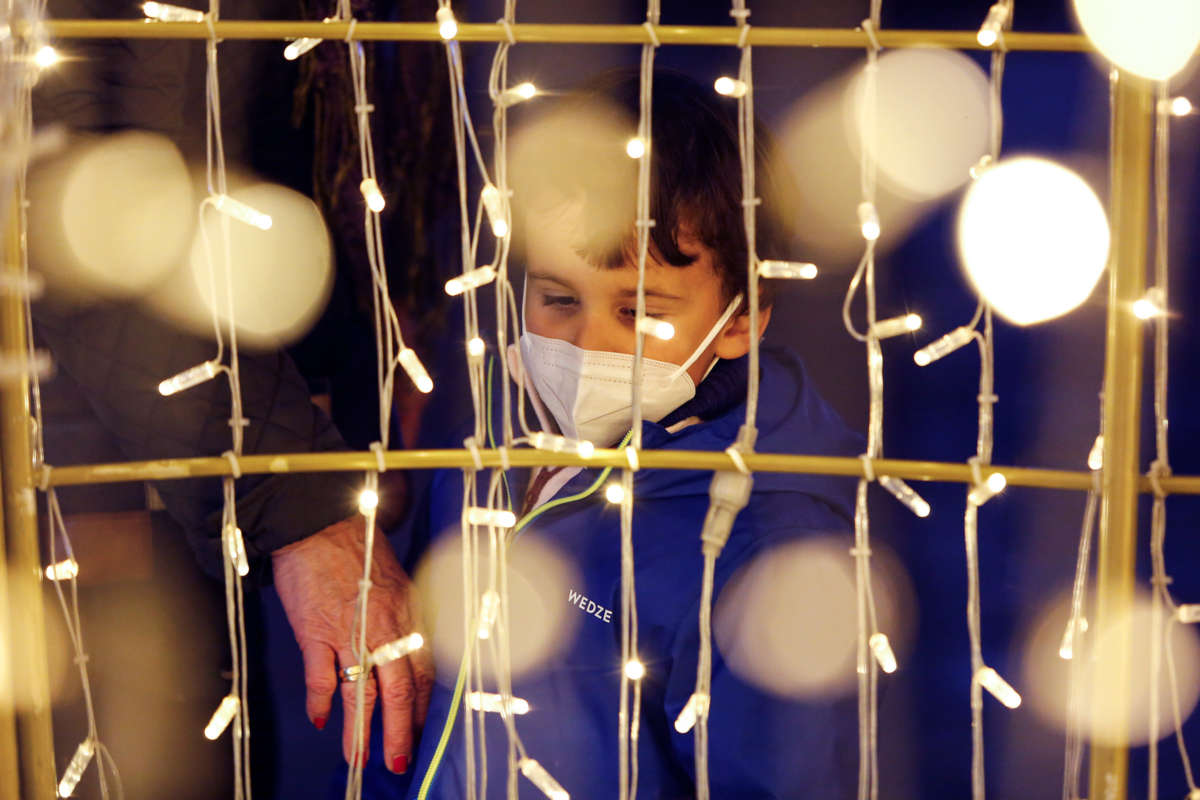Did you know that Truthout is a nonprofit and independently funded by readers like you? If you value what we do, please support our work with a donation.
“I wish it was over for good or ill,” laments J.R.R. Tolkien’s over-curious hobbit, Pippin, on the eve of Sauron’s siege at Minas Tirith. “I am no warrior at all and dislike any thought of battle; but waiting on the edge of one that I can’t escape is worst of all. What a long day it seems already!”
A long day indeed. Waiting on the edge is what many of us have been doing for nearly two years now, and not only is there no end in sight, there is yet another unavoidable battle waiting for us out there beyond the torchlight. Omicron is rising, even in my tiny little corner of New England. If it isn’t everywhere already — how can we know, given the shabby testing infrastructure we’re still saddled with? — it will be soon.
My mother canceled the annual Christmas gathering at her house this year for fear of this thing. She was very matter-of-fact about it — and altogether certain it was the responsible thing to do (I agree, for the record) — but I could hear the sadness in her voice nonetheless. Our family has never been Currier and Ives when it comes to this season, but it remains a beloved touchstone, especially now that she is the grandmother of a genuinely astonishing 8-year-old. Another book of memories stolen before they could be made.
My family remains among the fortunate in this slow-grinding ordeal. According to a mid-December New York Times report, COVID-19 has killed one out of every 100 people over the age of 65 in the U.S. That age group makes up a staggering 75 percent majority of the more than 800,000 who have died since all this began. That amounts to some 600,000 families who have lost an elder, leaving an empty seat at the Christmas dinner table.
Gloomy times all around. A small part of me envies those who have convinced themselves this is all a big nothing noise, or have just decided they are so over it, you guys. A fair portion of them might be sick or dead by springtime, especially those who remain willfully unvaccinated, but in this moment such flat denialism must be invigorating.
To not feel like this anymore is deeply tempting, a harlequin abandonment of worries and doubts, until I realize I would rather be lonely and alive than an iconoclastic dying person in an overcrowded ICU, tube down my windpipe in service to lungs now made of ash, begging for the vaccine that can’t help me anymore. A double-vaxxed friend who caught the Delta variant said it felt like her bones were on fire. Yeah, no, in the immortal words of Simple Minds, “I’ll be alone, dancin’, you know it baby…”
The hardest part is the change in perspective I need to make, if I want to keep my head on straight. That change? I have to stop believing this is all going to end someday soon, because it isn’t. A huge swath of the world remains unvaccinated, a dilemma that most Global North leaders don’t seem to be in any rush to address, and every one of those people is a potential petri dish for the next variant, and the next, and the next. Now comes Omicron, still a mystery but a confirmed fast-mover. There is a growing body of evidence to suggest Omicron’s symptoms are “mild,” but compared to what? A bear mauling? “Mild” still sounds pretty damn bad, and worse if you are older and/or unvaccinated.
How does it end, then? I have no idea. Maybe it really doesn’t. All I do know is that these last two years, and the years I suspect are coming, have once again forced me to recalibrate my concept of hope. Hope for me used to be results-based: I hope for something, and it happens or it doesn’t. COVID, the climate collapse and the generalized awful that is modern American politics, broke that mold.
Hope, now, is for me an exercise to see if I still have it in me to hope, despite all the reasons not to that are staring me in the face. The effort of hoping yields its own rewards, no matter the outcome and as intangible as they may sometimes seem. I sound like the last line from Rita Hayworth and the Shawshank Redemption (“I hope.”), but it’s the truth. Right now, it’s all we’ve got as we stand like Pippin waiting for the next battle, hoping to have hope.
Speaking against the authoritarian crackdown
In the midst of a nationwide attack on civil liberties, Truthout urgently needs your help.
Journalism is a critical tool in the fight against Trump and his extremist agenda. The right wing knows this — that’s why they’ve taken over many legacy media publications.
But we won’t let truth be replaced by propaganda. As the Trump administration works to silence dissent, please support nonprofit independent journalism. Truthout is almost entirely funded by individual giving, so a one-time or monthly donation goes a long way. Click below to sustain our work.
